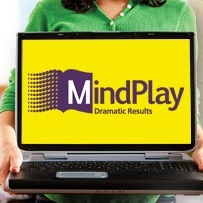Aligned to Common Core Standards MindPlay Virtual Reading Coach® improves reading performance through direct instruction
Tucson, AZ – Literacy publisher MindPlay, Inc. introduced a new upgraded version of its reading curriculum for grades K-12, MindPlay Virtual Reading Coach® (MVRC). All stories within the Web-based MVRC are now assigned Lexile® ratings by MetaMetrics®. MindPlay's Lexile text complexity ratings are consistent with Common Core State Standards. MVRC helps students improve their reading skills measurably in 40 hours or less by differentiating instruction for each student. Using explicit and direct instruction by reading specialists and speech pathologists, students work at their own pace. The program helps all students improve their reading, and is appropriate for special needs, dyslexic, struggling readers, and intermediate to advanced English language learners.
Based on years of research and successful case studies, MindPlay guarantees schools that 90 percent of students will gain at least two grade-levels of improvement in reading when using MVRC four days a week for 30 minutes each day, or MindPlay will refund their purchase. The program is now completely cloud-based and works on all computer platforms. Two important new reading instruction modules were added for Comprehension and Grammar as an aid to reading and writing. All other modules were enhanced. Additionally, there are new and improved real-time reports. Students are engaged by seven reading coach instructors instead of four who provide direct instruction, face to face, through photos and videos. An award-winning publisher, MindPlay has helped over 6 million people learn to read in its 30-year history.
MVRC helps teachers provide direct instruction to all students. It provides virtual reading specialists and speech pathologists, who students can see and hear onscreen through video. MVRC provides instruction in six essential reading components: Phonemic Awareness, Phonics, Vocabulary, Grammar for Meaning, Comprehension, and Fluency.
“For the last 30 years, I have been training special education teachers to help students who struggle to learn to read,” said Nancy Mather, Ph.D., Professor of Special Education at the University of Arizona. “Ideally, every child who struggles to learn to read would have individualized daily reading instruction by these highly trained teachers, but that isn’t possible. When I was introduced to MindPlay Virtual Reading Coach ( MVRC), I saw the quality and depth of this online reading program and was awestruck. I’d never considered that a computer application could deliver the quality individualized, evidence-based reading instruction needed to turn struggling readers into fluent readers; now I know it can!”
“Last summer a doctoral student from the University of Arizona conducted a research study with middle school students using MVRC, during which the students made significant gains in reading. I believe that using this reading program in schools will considerably reduce the number of children who may be retained because they are not reading at a third-grade level.”
MVRC automates for teachers the process of assessing reading skills and differentiating instruction. It enables all students to receive direct instruction that targets their specific and unique barriers to build accuracy and achieve fluent reading. The research-based program applies expert teaching methods. Students receive feedback targeted to help them understand and fix each error.
Each student’s reading abilities are first assessed with MindPlay’s complete diagnostic RAPS 360 test, and then the program instantly creates a prescriptive reading plan for them. Students are automatically assigned to their prescribed sequences of reading lessons and activities to begin immediately. While this diagnostic is now fully automated, teachers will know exactly where students need instruction. The test adapts to each student’s performance. This helps keep struggling readers comfortable and avoids unnecessary stress. In addition to the basic six reading components, the diagnostic mode also tests the effective tracking ability of students’ eyes, which is a necessary skill for reading fluency.
Features
Assessment and progress monitoring are embedded into MVRC. In addition, the program requires students to master each skill at 100 percent before they move to the next lesson, to ensure they do not miss any building blocks. This builds the concrete foundation students need for learning additional concepts and becoming fluent readers. The program addresses students’ different styles by presenting each concept multiple ways. When students are not successful in learning a skill, MVRCteaches it again in a different way. MVRC includes more than 20 levels of instruction on many lessons, when needed, and over 40 practice activities support their learning process.
Seven different virtual coaches and three certified speech pathologists guide students through the program and provide individualized feedback based on student performance. There are 44 phonemic awareness lessons, 62 phonics lessons, 40 comprehension skill lessons, and 60 grammar, meaning and writing lessons. Two additional modules provide students with practice in fluency and vocabulary with 30,000 vocabulary words. Students practice fluency and comprehension with a library of more than 1,000 different Lexiled® passages.
Several major enhancements were made to MVRC’s reporting system. Two new types of reports, an Achievement Report and Parent Report, are new additions.MVRC collects and records all data into a central reporting system in real time. With the update, teachers can now see what students are doing instantly as it happens from the report pages. The program provides reports at district, school, classroom, and student levels. Student data can now be exported to a .CSV file, which can be imported into Excel. Teachers and administrators can customize and export the reports they need to evaluate student progress.
Instructional Modules
MVRC ’s six instructional reading modules provide interactive, multiple learning style activities that help students stay focused and accelerate their progress. Four of these modules are updated and two are new:
1. Phonemic Awareness includes explicit and systematic instruction on the blending of sounds into words and segmentation of words into their individual sounds, essential steps in learning to read, write, and spell.
2. Phonics instruction is systematic, explicit and differentiated for sound-symbol relationships, long and short vowels, consonant digraphs, diphthongs, blends, syllable types, Latin and Greek roots. Students learn how to easily decode new words. Students learn the spelling pattern and practice each assigned lesson with mastery-based activities. Students are only assigned lessons that they need as determined by the placement test. Students experience a variety of different modalities as four of 12 activities are assigned based on lesson content.
3. The Vocabulary module includes over 30,000 words. Seven learning activities help students work on listening vocabulary skills. Students learn five related words at a time to expand their knowledge of words, roots, and affixes to derive word meaning from context.
4. Grammar for Meaning uses parts of speech to teach students how sentences are constructed for meaning. Students learn not to skip words when reading and to understand the function of each word, by encouraging them to form pictures in their minds. Pre and post testing of grammar skills from this module is also new and now active. The review test will assess the skills only in that set and will reassign lessons in that set only if needed.
5. Fluency systematically increases silent reading speed while ensuring proficient reading comprehension. With over 1,000 original stories in the Fluency library, the questions were completely revised to meet the Common Core Standards. Each story grades 2 to 12 has been assigned a text Lexile® as determined by MetaMetrics®. The text genre is selected randomly between expository and narrative. Each student begins the module with text slightly below their diagnosed reading grade level to comfortably ease into the program. Speed and practice is adapted to meet the needs of the learners. The words per minute rate will increase by 10 wpm from story to story based on successful comprehension. The speed will not increase unless the student comprehends the text. This module now uses the Dolch List of high-frequency words for the Word Match activity. This activity enables students to recognize these words with automaticity.
6. The Comprehension module, the second of the two new instructional modules added to MVRC, directly teaches almost 40 different reading comprehension skills and strategies. Comprehension questions are triggered by the questions a student misses in the Fluency stories. So a student only gets lessons that are needed. This is a mastery-based component that uses a new and dedicated virtual coach to teach a single objective. Instruction is scaffolded and differentiated as needed by each student. Questioning aligns with the Common Core State Standards reading skills. Some of the skills addressed include: summarizing and paraphrasing, author’s purpose, main idea, and comparing and contrasting.
Pricing and Availability
MVRC is available online now. For information and ordering, schools and districts can visit MindPlay at www.mindplay.com, or education resellers. The program is available from any computer with Internet access. Schools can purchase for $299 per student per year. More purchase options are available.
MindPlay, Inc.
More than 30 years ago, Founder Judith Bliss started the MindPlay Company to create a solution to overcome the challenges of learning to read. Her goal was to help struggling learners succeed in school and life, after overcoming her own reading disabilities. MindPlay’s mission is to develop, publish, and distribute cost-effective learning tools that support individual growth and skill development. The curriculum includes clear objectives, inviting graphics and modern technological innovations. MindPlay educational software programs appeal to multiple learning styles, identify individual student needs and differentiate instruction. For more information, please go to www.mindplay.com.











